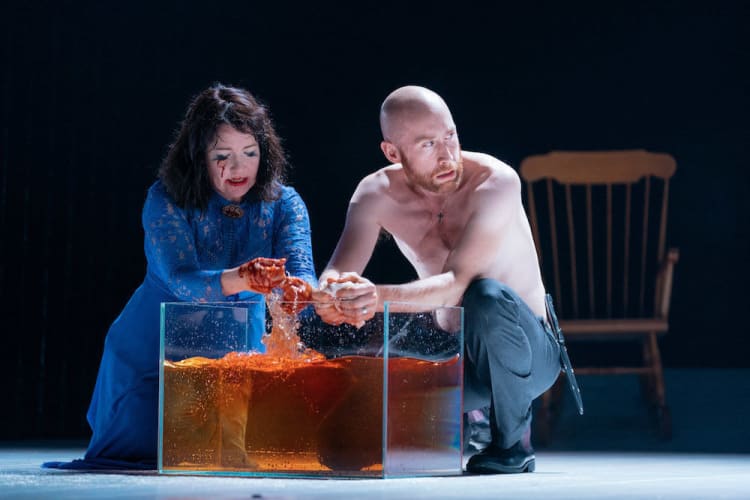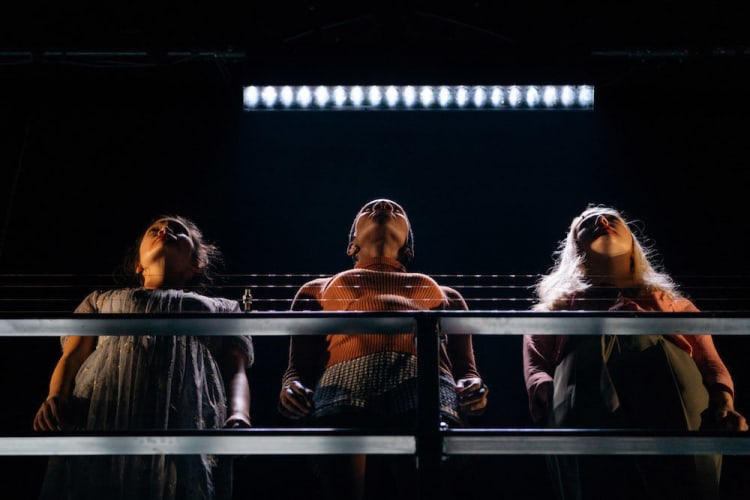As the title suggests, this piece is a combination of two of Shakespeare's plays, Othello and Macbeth, performed sequentially in that order, but heavily cut and linked together in an interesting way.
When I spoke to her for the BTG podcast, director Jude Christian explained that she wanted to reshape the plays to highlight the female characters, especially the ones who end up dead by the end of the plays. Of course many of the men die too, but it could be argued that they bring this about themselves through their tragic 'fatal flaw', whereas the women are, in many cases, collateral damage.
Othello is played out on a very shallow stage with a shiny metal backdrop and a metal gantry overhead (designer Basia Bińkowska). Iago's (Samuel Collings) part is cut to almost nothing, his only significant plot being the issue over the handkerchief, and so the play focuses heavily on Othello's (Ery Nzaramba) relationship with Desdemona (Kirsten Foster), going from public displays of affection (a bit too much for some in the school parties to take) to bitter jealousy and anger.
The production makes a feature of its cuts with a tape-winding sound and lighting effect whenever it jumps from the middle of one scene to the middle of a much later scene. I don't know whether it was partly due to the chattering and seat kicking from the school parties around me in the circle, but it took me a long while to find my bearings in the play and establish what was going on in the early scenes, which just seem to be a lot of standing still and talking. Later, the drama builds and the plot becomes clearer, Nzaramba managing to just about convince with his building anger and jealousy despite having much less to feed on from Iago.
Towards the interval, the three women from the first play—Kirsten Foster's Desdemona, Melissa Johns's Emilia and Kezrena James's Bianca—rise and don camouflage jackets as the wall flies to reveal the blasted heath: tiled and smoky with a single tree. As Macbeth's witches, they also take many of Macbeth's and Lady Macbeth's lines (including the "tomorrow and tomorrow and tomorrow" speech) to become more of a controlling force than mere sinister observers and predictors of the future.
This hints at, but doesn't fully explore, them having a role as a kind of Furies, seeking revenge on the men who caused their deaths in the first play even though they are now in different roles. There's a nice moment between Desdemona, now a Witch, and Othello, now the ghost of Banquo, and a handkerchief.
Sandy Grierson changes from Cassio into a strong portrayal of Macbeth, while Caroline Faber comes on fresh to be his Lady Macbeth. Other than the shifted role of the Witches, this plays out as just a condensed version of Macbeth with no special emphasis on the women in the story, although there are some interesting choices. For instance, Lady Macbeth, sat in a rocking chair cuddling an empty baby blanket, ends on a speech that seems to come from greater awareness and thoughtful intent rather than from madness, which works in this context.
Overall, it's an interesting experiment carried off with commitment that works in part, although I'm not sure that any radical feminist message can be taken from it. While not all of it I found to be clear in its storytelling, there are large parts of both plays that are quite gripping with some interesting new takes on the plays.



